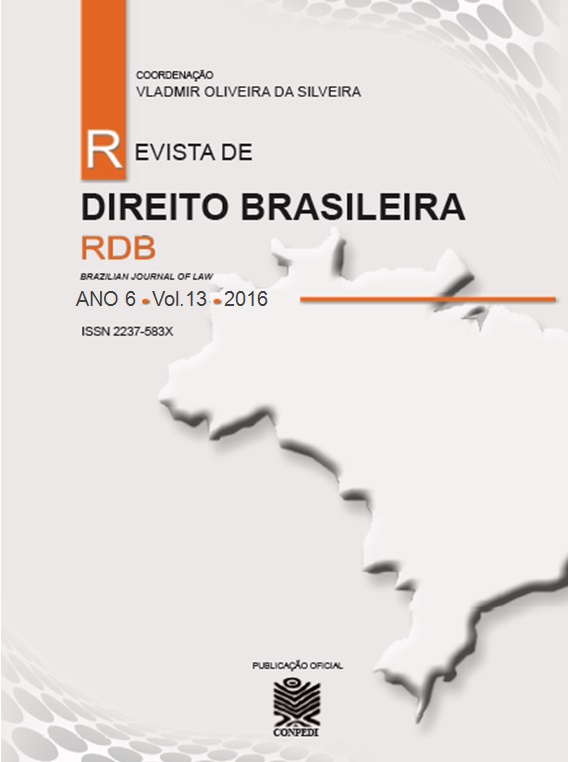CONSTRUCTING THE PRINCIPLE OF REPONSABILITY TO PROTECT TO STRENGTHE CLIMATE SECURITY
Main Article Content
Abstract
Downloads
Article Details
• O(s) autor(es) garante(m) que a contribuição é original e inédita e que não está em processo de avaliação em outra(s) revista(s);
• A revista não se responsabiliza pelas opiniões, ideias e conceitos emitidos nos textos, por serem de inteira responsabilidade de seu(s) autor(es);
• É reservado aos editores o direito de proceder ajustes textuais e de adequação do artigo às normas da publicação.
Autores mantêm os direitos autorais e concedem à revista o direito de primeira publicação, com o trabalho simultaneamente licenciado sob a Licença Creative Commons Attribution que permite o compartilhamento do trabalho com reconhecimento da autoria e publicação inicial nesta revista.
Autores têm autorização para assumir contratos adicionais separadamente, para distribuição não exclusiva da versão do trabalho publicada nesta revista (ex.: publicar em repositório institucional ou como capítulo de livro), com reconhecimento de autoria e publicação inicial nesta revista.
Autores têm permissão e são estimulados a publicar e distribuir seu trabalho online (ex.: em repositórios institucionais ou na sua página pessoal) a qualquer ponto antes ou durante o processo editorial, já que isso pode gerar alterações produtivas, bem como aumentar o impacto e a citação do trabalho publicado (Veja O Efeito do Acesso Livre) emhttp://opcit.eprints.org/oacitation-biblio.html
References
AÑAÑOS MEZA, C., “La "responsabilidad de proteger" en Naciones Unidas y la doctrina de la "responsabilidad de proteger”, Anuario Mexicano de Derecho internacional,
BALLBÉ MALLOL, M., Seguridad Integral. Un nuevo concepto. Madrid: Instituto Superior de Estudios de Seguridad, 2003.
BERMEJO GARCÍA, R., LÓPEZ-JACOISTE DÍAZ, E., “De la intervención por causas humanitarias a la responsabilidad de proteger. Fundamentos, similitudes y diferencias”, INSTITUTO ESPAÑOL DE ESTUDIOS ESTRATÉGICOS, La respuesta del derecho internacional a los problemas actuales de la seguridad global, Ministerio de Defensa, Cuadernos de Estrategia, n. 160, enero 2013.
EVANS, G., "La responsabilidad de proteger", Revista de la OTAN, invierno de 2002.
GARCÍA PÉREZ, R., "La `responsabilidad de proteger´: un nuevo papel para Naciones Unidas en la gestión de la seguridad internacional", 11 Revista Electrónica de Estudios Internacionales, 2006.
HARDCASTLE, R. J., CHUA, A. T. L, “Asistencia humanitaria: hacia el derecho de tener acceso a las víctimas de desastres naturales”, Revista Internacional de la Cruz Roja, 1998.
HELLY, D., A., "The EU and the R2P: Towards Pragmatic International Subsidiarity?",Internationale Politik und Gesellschaft, 1/2009.
HILPOLD, P., "The Duty to Protect and the Reform of the UN A New Step in the Development of International Law?", 10 Max Planck Yearbook of United Nations Law, 2006.
KALDOR, M., Las nuevas guerras. Violencia organizada en la era global, Barcelona, Tusquets Editores, 2001.
LÓPEZ-JACOISTE DÍAZ, E., "La responsabilidad de proteger: reflexiones sobre su fundamento y articulación", Anuario Español de Derecho Internacional, vol. XXII, 2005.
MOLIER, G., "Humanitarian Intervention and the Responsibility to Protect After 9/11", Netherlands International Law Review, vol. LIII, 2006.
MOONEY, E., “Los Principios Rectores y la responsabilidad de proteger”, Revista Migraciones Forzadas, N. especial (dic. 2008). ISSN 1460-9819.
MURITHI, T., “The African Union´s transition from non-intervention to non-indifference: an ad hoc approach to the Responsibility to Protect?” International Politics and Society, núm. 1, 2009.
NEWMAN, E., "Humanitarian Intervention, Legality and Legitimacy", The International Journal of Human Rights, 6, 2002.
ÖZDEN, M., ASTRUC, M., “Responsabilidad de proteger: ¿progreso o retroceso del Derecho Internacional Público?”, Cuaderno crítico, núm 12, CETIM, diciembre 2013.
REVILLA MONTOYA, P., “Hacia la responsabilidad para proteger. Bases jurídicas para una respuesta colectiva ante crisis humanitarias”, en Anuario Mexicano de Derecho Internacional, vol. VII, 2007, pp. 643-673.
SCHALLER, Ch., "Human Security: The Seven Challenges of Operationalizing the Concept", Human Security: 60 minutes to Convince, París, UNESCO, 13 de septiembre de 2005.
SPIERMANN, O., "Humanitarian Intervention as a Necessity and the Threat or Use of Jus Cogens", Nordic Journal of International Law, 2002.
STAHN, C., "Responsability to Protect: Political Rhetoric or Emerging Legal Norm?", 101 AJIL, núm. 1, 2007.
THAKUR, R., The United Nations, Peace and Security. From Collective Security to the Responsibility to Protect, Cambridge, Cambridge University Press, 2006.





